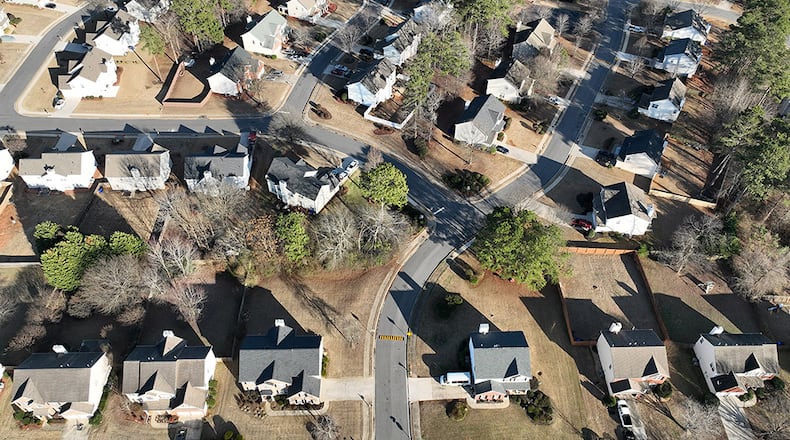The Peach State is no stranger to institutional investment in housing, with many arguing it narrows the playing field for low- and middle-income buyers and makes the American dream of home ownership more difficult.
It was an issue brought into stark relief in The Atlanta Journal-Constitution’s investigative series, “American Dream for Rent,” which called Greater Atlanta “ground zero” for corporate investment in housing.
A new analysis by the Wall Street watchdog the Private Equity Stakeholder Project published on Tuesday compounded those findings, ranking Georgia as the most at risk state in the nation for market disruptions, rental increases and unsafe conditions from private equity investment in housing.
The analysis gave Georgia the highest possible private equity risk score of 100 in its housing category, finding that from 2018 to 2022 about 17% of homes in the state were purchased by medium, large or “mega” investors — a more than 62% change over the same period. The group relied on data from CoreLogic and research from the Pew Charitable Trust to reach its housing scores.
Jordan Ash, housing director for the non-profit, said private equity interest means many U.S. consumers are being squeezed out of the market for new homes — a finding that mirrors the AJC investigation that analyzed tax assessor data across 11 metro Atlanta counties to identify every home purchased by investors that own more than 50 houses.
Institutional investment increases the likelihood of rent increases and poorly maintained homes, according to Ash.
Ash said corporate buyers were taking advantage of technology to swoop in and make all-cash offers for homes as soon as they hit the market, giving them an obvious advantage over the average consumer — another parallel finding to the AJC series.
“You can’t compete with the business model as an individual,” Ash said, adding that the problem is not unique to Georgia. “Housing has become viewed as an investment, rather than as meeting people’s basic needs.
“The impact has been to drive housing prices up everywhere.”
Those in the hunt for a home in the U.S. need to make about $114,000 a year to buy the typical house, according to a recent analysis by national real estate brokerage site Redfin. That is 35% more than the median household income of $84,000.
According to the most recent Zillow rental market data, the median rent in Atlanta is $2,075, slightly lower than the national median of $2,092. Earlier this year, the Harvard Joint Center for Housing Studies released a report finding that almost half of all renters are paying more than 30% of their income towards rent and utilities.
But David Howard chief executive officer of the trade association the National Rental Home Council pushed back against the Private Equity Stakeholder Project’s analysis. He argued there was little evidence private equity investment had disrupted the housing market in the state, noting that the homeownership rate is higher now in metro Atlanta’s five counties than it was five years ago.
“Regarding rents, market data show it’s about $1,000 less expensive to rent than own a single-family home,” Howard said, citing June 2023 data from the firm John Burns Research and Consulting.
Taylor Shelton, an assistant professor in the Department of Geosciences at Georgia State, co-authored a recent study finding the companies Invitation Homes, Pretium Partners, and Amherst have a stake in almost 11% of single-family rental homes in five metro Atlanta counties, including Fulton, Clayton, DeKalb, Gwinnett and Cobb.
He said that institutional investors are not wholly to blame for conditions in the housing market — “not by any stretch of the imagination.” He argued, however, that institutional investment had made a bad situation worse.
“The biggest issue that faces the housing market is that we treat it as a market for a commodity, not as a human right or a public good,” he said. “These companies are undoubtedly a major contributor to that dynamic.”
The Private Equity Stakeholder Project proposed several policy solutions, including laws barring landlords from evicting tenants unless they have good cause; an annual cap on rents in line with inflation; a first right of refusal for tenants to purchase homes they rent; and a landlord registry that identifies corporate landlords that have multiple holdings.
Housing was one of four categories the watchdog looked at as it ranked states. It assessed the risk to state workers and jobs, health care and pensions finding New Mexico is at the greatest risk overall from private equity. Georgia ranked sixth, with an overall risk score of 86. According to the group, the score represents a “very high risk.”
“By providing transparent data on the risks associated with private equity investments, we empower communities, working families, and policymakers to advocate for change and protect their states from the threats posed by unchecked private equity firms,” Chris Noble, policy director at the non-profit, said in prepared remarks. “This is an important step toward mitigating the risk and tangible harms wrought by private equity across the country.”
About the Author
Keep Reading
The Latest
Featured



